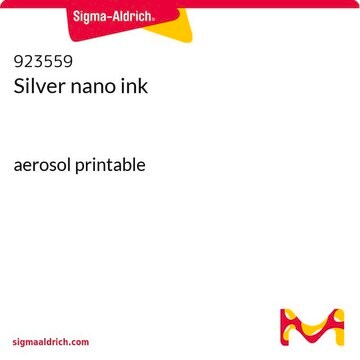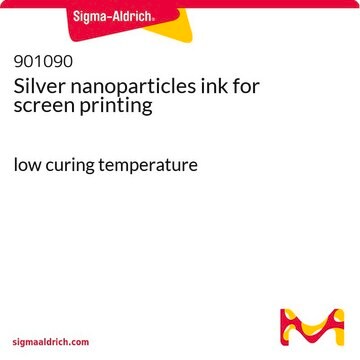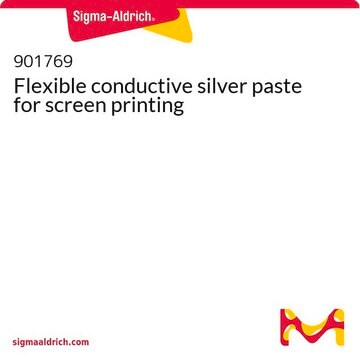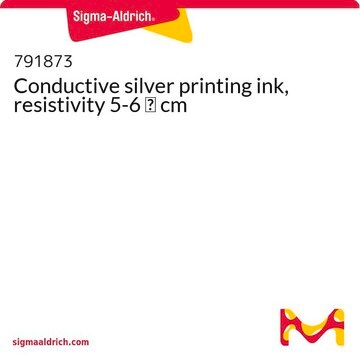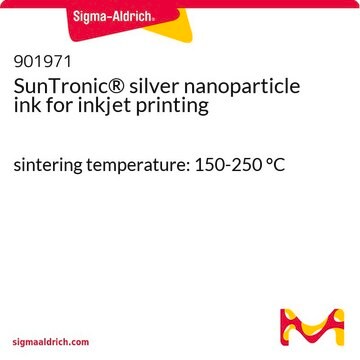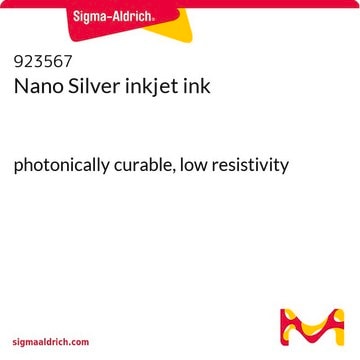907669
Silver ink
75 wt%, LIFT printable
Synonym(s):
Ag ink, Laser induced forward transfer
About This Item
Recommended Products
description
Silver content : 75 wt%
Solvent : Diethylene Glycol Mono Butyl Ether (DGBE)
Surface Tension : 28 dyn/cm (Pendant Drop)
form
paste
particle size
50-70 nm (by Lumisizer™)
90-120 nm (by Lumisizer™)
viscosity
50,000-100,000 cP (Shear Rate: 1 s-1
250cP - 450 cP (Shear Rate: 1000 s-1))
density
2.85-3.3
storage temp.
15-25°C
Application
The ink offers:
- Uniform and reproducible donor layer with low drying speed
- Stable accurate jetting in different types of laser systems, wide working window of jetting parameters
- High speed printing (20-50kHz), allowing high throughput
- Narrow patterning on plastic and glass substrates (line width ∼50 μm, height ∼0.5 μm, spacing ∼50 μm)
- Laser sintering of LIFT printed pattern, providing good electrical properties
Fit for:
LIFT digital printing
Additive electronic manufacturing
Printed electronics: RFID, FPD, Sensors
Laser induced forward transfer printing (LIFT) is a non-contact, nozzle-free, one step, direct laser writing process.
LIFT can operate under atmospheric conditions, is compatible with low laser fluences, allows the printing of organic and inorganic materials as well as biological elements. The printing process can take place from both liquid and solid phases. It further has a high lateral resolution only defined by the laser spot size. It is a method compatible with inorganic semiconductor sensor fabrication, OLED fabrication and bio printing.
Other Notes
*Parameters should be optimized depending on line geometry and substrate
Storage and Stability
Legal Information
Signal Word
Warning
Hazard Statements
Precautionary Statements
Hazard Classifications
Aquatic Acute 1 - Aquatic Chronic 1 - Eye Irrit. 2
Storage Class Code
10 - Combustible liquids
WGK
WGK 3
Flash Point(F)
Not applicable
Flash Point(C)
Not applicable
Regulatory Listings
Regulatory Listings are mainly provided for chemical products. Only limited information can be provided here for non-chemical products. No entry means none of the components are listed. It is the user’s obligation to ensure the safe and legal use of the product.
EU REACH Annex XVII (Restriction List)
Choose from one of the most recent versions:
Certificates of Analysis (COA)
Don't see the Right Version?
If you require a particular version, you can look up a specific certificate by the Lot or Batch number.
Already Own This Product?
Find documentation for the products that you have recently purchased in the Document Library.
Customers Also Viewed
Articles
Small molecular weight organic semiconductors are promising for flexible transistor applications in next-gen soft electronics.
Professors Tokito and Takeda share design principles and optimization protocols for organic electronic devices, focusing on flexibility and low cost.
Our team of scientists has experience in all areas of research including Life Science, Material Science, Chemical Synthesis, Chromatography, Analytical and many others.
Contact Technical Service
